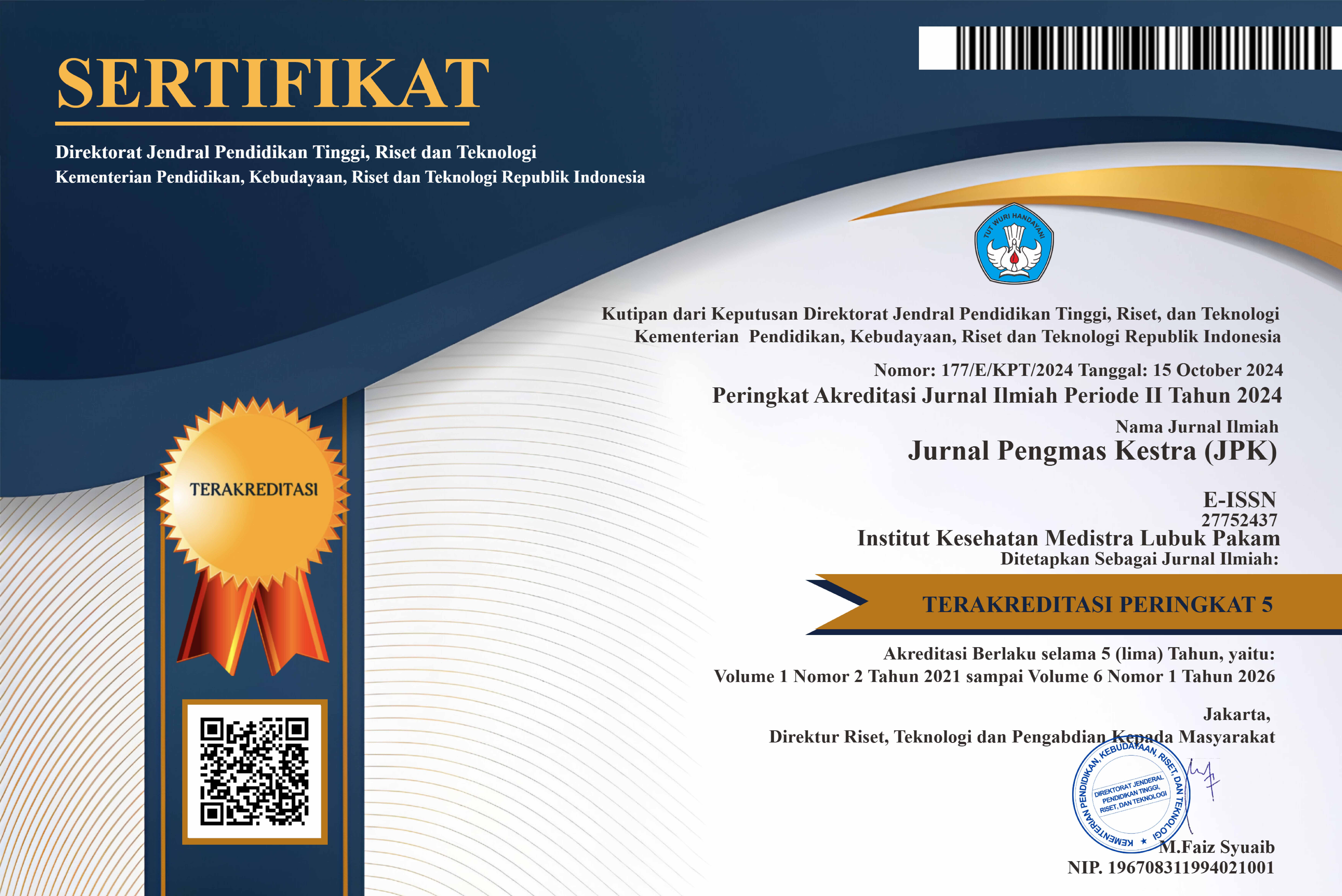Socialization of Medicinal Plant Utilization and its Development Potential for Students of Private Vocational School Al Razi Sinar Harapan Medan
DOI:
https://doi.org/10.35451/jpk.v3i2.1953Keywords:
Medicinal plants, Socialization, Private Vocational School Al Razi SInar Harapan Medan, DevelopmentAbstract
Medicinal plants have long been inseparable from Indonesia's cultural heritage and hold significant potential for developing the healthcare and economic sectors. However, the understanding of the younger generation regarding the benefits and value of medicinal plants still needs to be improved. This article examines efforts to promote the importance of medicinal plants, mainly targeted at Clinical and Community Pharmacy Study Program students at Al Razi Sinar Harapan Medan Private Vocational School. In an attempt to address this issue, promoting the benefits and potential of medicinal plants becomes crucial. The activities aim to enhance the awareness and understanding of participants about the significance of medicinal plants in the realms of healthcare and industry. The methods used in these activities include lectures, group discussions, practical demonstrations, and evaluations. These promotion activities show positive and encouraging outcomes, significantly improving participants' understanding of medicinal plants. Most participants who participated in these activities are intensely interested in further exploring medicinal plants, with some even considering pursuing a career in this field. Despite the high level of interest, several challenges still need to be addressed in harnessing the potential of medicinal plants, including limited scientific research, insufficient educational resources, and regulatory hurdles. Overall, with the appropriate approach and cross-sector collaboration, medicinal plants have substantial potential to become a new cornerstone in the healthcare and economic sectors in North Sumatra and throughout Indonesia. Initiatives like these promotions were expected to serve as a promising initial step in uncovering and realizing this potential. With increased understanding and interest among the younger generation in medicinal plants, they can actively contribute to the sustainable development and utilization of these valuable resources, thereby advancing the healthcare sector and supporting the nation's economic growth.
References
Daeli, D. Y. (2023). Studi Etnobotani Tanaman Obat Tradisional Pada Masyarakat di Desa Orahili Kecamatan Sirombu Kabupaten Nias Barat. Tunas: Jurnal Pendidikan Biologi, 4(1), 1–16.
Hidayati, N. R., Mukharomah, S., & Fatimah, T. (2023). Systematical Review: Kajian Potensi Tanaman Obat di Indonesia untuk Mengatasi Penyakit Kulit. Prosiding University Research Colloquium, 1267–1283.
Istiyanti, E., & Sarjiyah, S. (2022). Penjaminan mutu produk olahan tanaman obat dalam perluasan pangsa pasar. JPPM (Jurnal Pengabdian Dan Pemberdayaan Masyarakat), 6(2), 393–399.
Kameswari, D. (2023). Pemanfaatan Tanaman Herbal dalam Praktik Pengobatan Tradisional Suku Baduy, Kabupaten Lebak, Banten. Briliant: Jurnal Riset Dan Konseptual, 8(1), 160–169.
Margo, E., Kartadinata, E., & Chudri, J. (2023). Edukasi dan Pelatihan Pengolahan Tanaman Obat Untuk Menunjang Kesehatan Masyarakat Kelurahan Angke. Jurnal Pengabdian Nasional (JPN) Indonesia, 4(2), 452–458.
Marjoni, M. R., Arfiandi, A., & Fadjria, N. (2023). Pemanfaatan Tanaman Obat Untuk Meningkatkan Kesehatan Masyarakat Di Desa Pariangan Kabupaten Tanah Datar. Joong-Ki: Jurnal Pengabdian Masyarakat, 2(1), 37–42.
Nor, I., Latifah, N., Zamzani, I., Sa’adah, H., Fatmawati, E., Nurhanifah, D., & Rahma, A. (2023). Pemanfaatan dan Peningkatan Produktivitas Tanaman Obat Keluarga (TOGA) untuk Minuman Tradisional Herbal sebagai Imunostimulan. SELAPARANG: Jurnal Pengabdian Masyarakat Berkemajuan, 7(1), 190–195.
Novian, N., Sarijal, A., Yulianti, A. R., Pratiwi, E., Oktaviana, F. A., Gaol, H. S. P. L., Rahma, I. A., Lukman, L., Firdaus, M. R., & Wulandari, P. Z. (2023). Merevitalisasi Tanaman Obat Keluarga (TOGA) Desa Tanjung Rambutan. AlKhidmah: Jurnal Pengabdian Dan Kemitraan Masyarakat, 1(4), 33–40.
Pagea, A. C., Yusro, F., & Mariani, Y. (2022). Keragaman jenis tanaman obat tradisional yang dimanfaatkan oleh Battra di Desa Sepang Kabupaten mempawah. Jurnal Serambi Engineering, 7(4).
Ratnaningrum, K., Rakhmawatie, M. D., & Marfu’ati, N. (2023). Edukasi Pengetahuan Infeksi Jamur Superfisial dan Potensi Penggunaan Tanaman Obat sebagai Terapi Antijamur. Jurnal Inovasi Dan Pengabdian Masyarakat Indonesia, 2(1), 1–4.
Ritonga, A. H., Aritonang, B., Harefa, K., Sitorus, R. S., & Meilani, D. (2022). Counseling On The Use Of Infused Water For Body Health In Junior High Schools Amal Luhur Medan: Counseling On The Use Of Infused Water For Body Health In Junior High Schools Amal Luhur Medan. Jurnal Pengmas Kestra (JPK), 2(2), 184–190.
Ritonga, A. H., Harefa, K., & Sitorus, R. S. (2023). Socialization and Providing Motivation on Health Professionals at National and International Levels: Challenges and Strategies for Students of State Vocational High School 3 Medan. Jurnal Pengmas Kestra (JPK), 3(1), 13–19.
Sitorban, T. N., & Nursaadah, E. (2023). Keanekaragaman Hayati Tumbuhan Obat Tradisional dan Pemanfaatanya. Bioedusains: Jurnal Pendidikan Biologi Dan Sains, 6(2), 531–544.
Tiwari, P., Bajpai, M., & Sharma, A. (2023). Antimicrobials from Medicinal Plants: Key Examples, Success Stories and Prospects in Tackling Antibiotic Resistance. Letters in Drug Design & Discovery, 20(4), 420–438.
Turnip, N. U. M. B., Sirait, N. Y., Syarifuddin, A., & Purba, N. (2021). Sosialisasi Pemanfaatan Ekstrak Daun Sawo Manila (Manilkara Zapota) Sebagai Antibakteri Terhadap Bakteri Streptococcus Mutans. Jurnal Pengmas Kestra (JPK), 1(2), 354–359.
Downloads
Published
Issue
Section
License
Copyright (c) 2023 Ahmad Hafizullah Ritonga, Hasni Yaturramadhan Harahap, Herlina Herlina, Karnirius Harefa, Rotua Sumihar Sitorus

This work is licensed under a Creative Commons Attribution 4.0 International License.
Copyright in each article is the property of the Author.




















